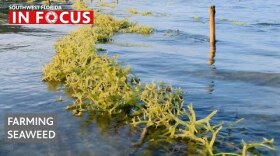-
With Florida's citrus industry declining, it's important for growers to have robust backup crops to prevent financial loss. Dr. Zhanao Deng and his team with the University of Florida are decoding blackberry DNA to help Floridian growers.
-
Artificial intelligence is making its way into the way our crops are grown and harvested. A new center to apply AI to local agriculture will break ground Friday in Wimauma.
-
It's one of the most versatile types of vegetations that exists. As the citrus industry continues to falter in Florida, is seaweed be an option to become part of the Florida Agricultural Industry?
-
Farmers said intense immigration enforcement is creating fear among their employees who work on H-2A visas.
-
Some scientists believe that sending seeds into space could help them adapt to future climate challenges.
-
Growers may also lose some chemicals popularly used to fight against fungal diseases through proposed federal regulation changes.
-
Use of technology and growing more on less land are major keys to survival for the Florida agriculture industry.
-
Officials said that some farmers may have avoided additional devastating losses from Helene, but only because they had not yet replanted after Debby hit just eight weeks before.
-
It's estimated Milton caused between $1.5 billion and $2.5 billion in damages on top of more than $1.5 billion from Idalia, Debby and Helene.
-
The national report comes shortly after Florida banned local heat protections for outdoor workers.
-
Genetic testing will help Florida ranchers select and breed cattle that better tolerate the heat.
-
“You know the best way to end up with a million dollars in farming?” jokes Rod Greder, a former cattle farmer from Iowa. “Start with 2 million.”
Play Live Radio
Next Up:
0:00
0:00
Available On Air Stations












